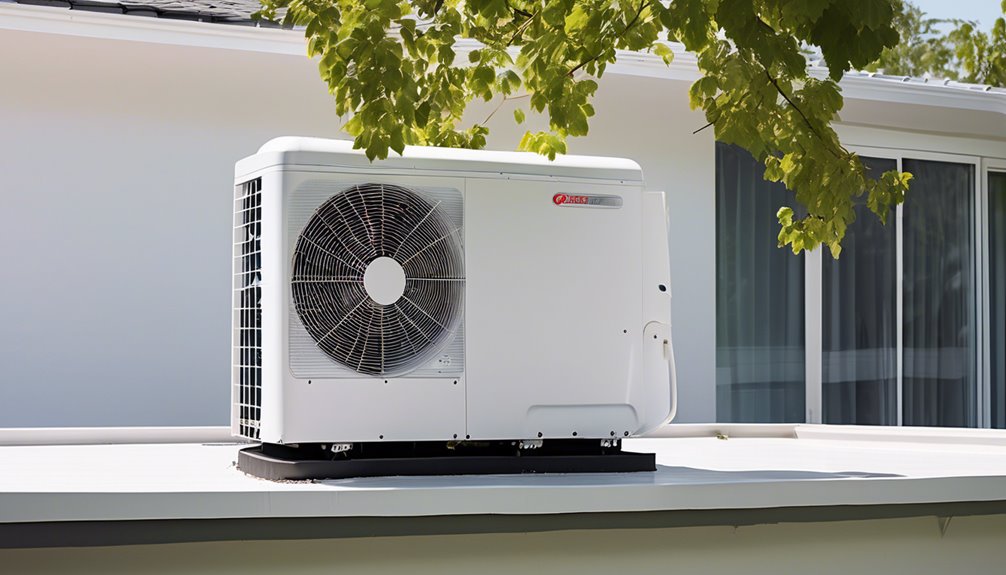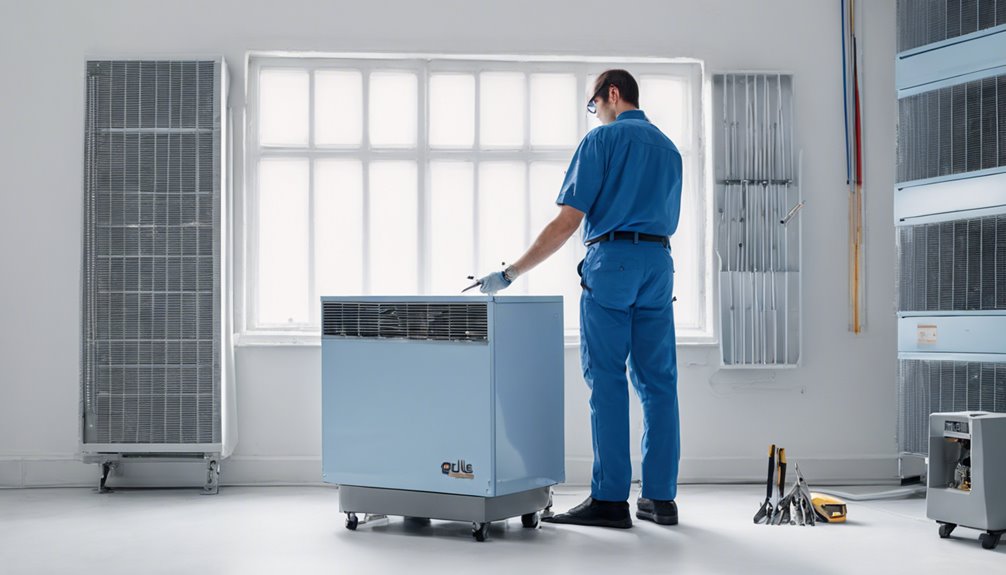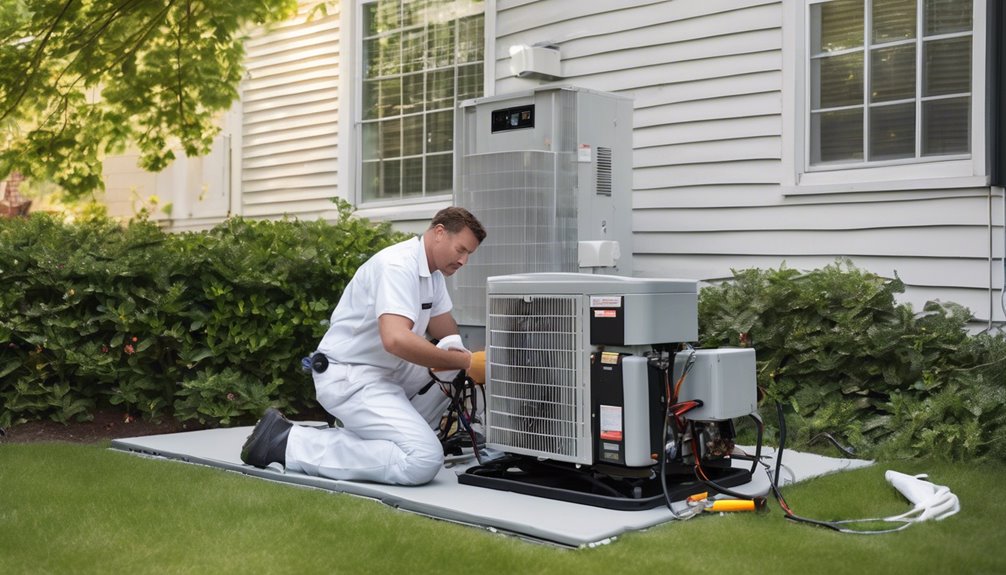By investing in regular AC maintenance, you can save up to 10% on your energy bills. Seasonal tune-ups identify and address energy-wasting issues, ensuring your air conditioner operates at peak performance. Dirty coils, clogged air filters, and contaminated refrigerant can drive up your energy consumption, but regular maintenance can prevent these issues. Want to know more about how maintaining your AC can optimize its efficiency and reduce your energy costs?
Key Takeaways
- Regular AC maintenance reduces energy consumption by identifying and addressing issues that drive up energy bills.
- Clean coils and air filters ensure optimal system performance, decreasing energy waste and consumption.
- Refrigerant maintenance detects leaks and ensures quality, preventing increased energy bills and reduced cooling performance.
- Regular tune-ups optimize AC performance, reducing energy consumption by 5-10% through seasonal checks and comprehensive energy audits.
- Extended equipment lifespan and reduced need for premature replacements further contribute to long-term energy savings.
The Importance of Regular Tune-Ups
Most homeowners don't realize that their air conditioner is a complex system that requires regular maintenance to function efficiently.
Without it, you'll likely face frequent breakdowns, increased energy bills, and a shortened system lifespan. Regular tune-ups can prevent these issues by identifying and addressing potential problems before they escalate.
During a system check, a technician with expertise will inspect your AC's components, clean or replace filters, and lubricate moving parts. This ensures your system operates at peak performance, reducing the risk of sudden failures.
How Maintenance Impacts Energy Efficiency
By keeping your air conditioner in top shape through regular maintenance, you're not only preventing breakdowns and prolonging its lifespan, but you're also reaping significant energy efficiency benefits.
During system checks, technicians identify and address issues that could be driving up your energy bills. They'll inspect and clean components, ensuring they're functioning at optimal levels.
Technicians identify and address issues driving up energy bills, inspecting and cleaning components to ensure optimal function.
Additionally, energy audits can help you pinpoint areas where energy is being wasted, allowing you to make targeted improvements. By optimizing your AC's performance, you'll reduce energy consumption and lower your utility bills.
Regular maintenance is a simple yet effective way to save energy and money, while also reducing your environmental impact.
Dirty Coils and Clogged Air Filters
Dirty coils and clogged air filters are two common issues that can significantly impede your air conditioner's performance. When your coils are dirty, they can't dissipate heat efficiently, causing your AC to work harder and consume more energy. Similarly, clogged air filters restrict airflow, making your AC work overtime to cool your space. Regular coil cleaning and filter inspection can help prevent these issues.
| Issue | Effect on AC Performance | Solution |
|---|---|---|
| Dirty Coils | Reduced heat dissipation, increased energy consumption | Coil cleaning |
| Clogged Air Filters | Restricted airflow, increased energy consumption | Filter inspection and replacement |
| Both Issues | Compounded energy consumption, reduced AC lifespan | Regular maintenance schedule |
| Neglecting Maintenance | Increased energy bills, frequent repairs | Prioritize maintenance tasks |
| Proper Maintenance | Improved energy efficiency, extended AC lifespan | Stay on top of maintenance tasks |
The Role of Refrigerant in Energy Consumption
Your air conditioner's refrigerant plays a crucial role in its ability to cool your space efficiently.
Refrigerant quality directly affects your AC's energy consumption. If your refrigerant is contaminated or degraded, it can lead to increased energy bills and reduced cooling performance.
Refrigerant leaks are another common issue that can cause your AC to work harder, consuming more energy in the process. Leaks can also lead to refrigerant loss, which not only wastes energy but also harms the environment.
Regular maintenance can detect refrigerant leaks and ensure the quality of your refrigerant, saving you energy and money in the long run. By keeping your refrigerant in top condition, you can enjoy efficient cooling while reducing your energy consumption.
Optimizing Thermostat Settings and Usage
Optimizing your thermostat settings and usage is a simple yet effective way to reduce energy consumption and save money on your utility bills.
By making a few adjustments, you can enjoy a cooler home while keeping your energy costs in check.
- Imagine coming home to a cool and comfortable living space every day, without breaking the bank.
- With smart scheduling, you can program your thermostat to adjust the temperature when you're not home or when you're sleeping.
- Zoned cooling allows you to cool only the areas of your home that need it, reducing energy waste.
- You'll be doing your part for the environment by reducing your carbon footprint.
- And, you'll have more money in your pocket to enjoy the things you love.
Measuring the ROI of Regular AC Maintenance
When you invest in regular AC maintenance, you'll want to know what kind of return you can expect.
You'll likely see energy savings potential, as a well-maintained system uses less power to cool your space. By reducing maintenance costs and boosting system efficiency, you'll be able to calculate a tangible ROI on your maintenance investment.
Energy Savings Potential
Regular AC maintenance can significantly reduce your energy consumption, leading to substantial cost savings over time.
By keeping your air conditioner in top condition, you'll use less energy to cool your home. This is especially important if you're looking to reduce your carbon footprint.
- A 5-10% reduction in energy consumption through regular Seasonal checks and tune-ups
- Identification of energy-wasting issues through comprehensive Energy audits
- Extended equipment lifespan, reducing the need for premature replacements
- Improved indoor air quality, enhancing your overall comfort and health
- A reduced risk of sudden breakdowns, keeping you cool and stress-free during hot summer months
Maintenance Cost Reduction
By investing in regular AC maintenance, you can significantly reduce your maintenance costs over time.
This proactive approach allows for better budget planning, as you'll be able to anticipate and prepare for potential issues. Regular maintenance also extends the lifespan of your AC system, delaying the need for costly replacements.
With a well-maintained system, you'll experience fewer breakdowns, which means fewer emergency repairs and lower maintenance bills. By measuring the ROI of regular AC maintenance, you'll see that the initial investment pays off in the long run.
System Efficiency Boost
You've already seen how regular AC maintenance can help you save on maintenance costs, but that's not the only benefit.
Regular system checks and tune-ups can also boost your air conditioner's efficiency, saving you energy and money.
By measuring performance metrics like energy consumption and cooling capacity, you can track the impact of regular maintenance on your system's efficiency.
- Your energy bills will decrease, putting more money back in your pocket
- Your AC will last longer, delaying the need for a costly replacement
- You'll reduce your carbon footprint, contributing to a cleaner environment
- Your home will stay cooler and more comfortable, improving your quality of life
- You'll enjoy peace of mind, knowing your AC is running smoothly and efficiently
Frequently Asked Questions
Can I Perform AC Maintenance Tasks Myself or Hire a Professional?
You can tackle simple AC maintenance tasks with a DIY toolkit, but for complex issues, it's best to hire a professional with expertise to ensure the job is done efficiently and safely, avoiding potential risks.
How Often Should I Replace My Air Conditioner's Air Filter?
You should replace your air conditioner's filter every 1-3 months, depending on filter quality and usage. Cleaning the filter can extend its life, but if it's damaged or dirty, it's best to replace it to maintain efficiency and airflow.
What Is the Ideal Thermostat Temperature for Energy Efficiency?
You're aiming for summer comfort while maximizing energy savings. To achieve this, you set your thermostat to an ideal temperature between 68-72°F (20-22°C) when you're home, and 5-10°F (3-6°C) higher when you're away or sleeping.
Can Regular Maintenance Extend the Lifespan of My AC Unit?
You'll be happy to know that regular maintenance can definitely extend the lifespan of your AC unit, boosting unit efficiency and system reliability, which means you'll get more years of cool comfort without frequent replacements.
Will Regular Maintenance Reduce My Ac's Noise Level?
You'll be happy to know that regular maintenance can significantly reduce your AC's noise level, employing noise reduction techniques to ensure silent operation benefits, making your home a more peaceful and comfortable space for you and your family.
Conclusion
You've invested in a top-notch air conditioning system, but are you getting the most out of it? Regular AC maintenance is key to saving energy and reducing your utility bills. By keeping your system in top shape, you can optimize its performance, reduce energy consumption, and even extend its lifespan. With regular tune-ups, you can enjoy a cooler, more comfortable home while keeping your wallet happy.



